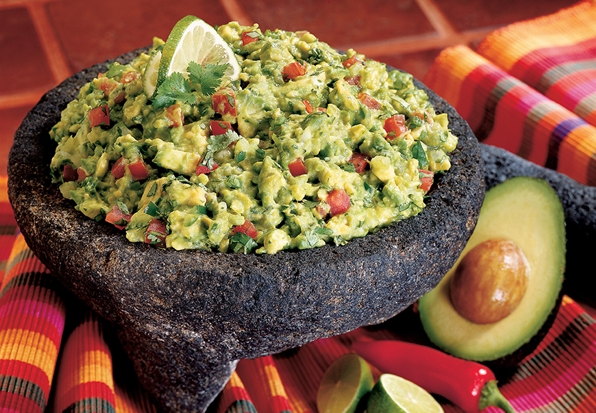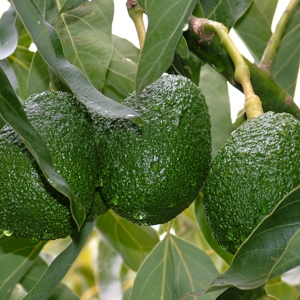I think the vast majority of folks in the Developed Western Countries have tried avocado at one time or another, and the majority of them liked it. We tend to use it as a dip or garnish (Guacamole), or sliced on salads or Avocado Toast. But it may also have important therapeutic benefits…
 Beautiful, authentic Guacamole: The avocado at it’s best!
Beautiful, authentic Guacamole: The avocado at it’s best!
A serving a day keeps the heart attack away?
Back in May, 2019, we explored claims by researchers at the Illinois Institute of Technology that making avocados a regular part of our diet could help us lose weight, or at least maintain a proper weight. Their take was that, if we replaced foods high in saturated fats and carbs with avocado, we could improve our health in a number of ways.
That trial revealed that serving Avocado in place of traditional carbohydrates resulted in a significant reduction in hunger and an increase in how satisfied participants felt, even 6 hours later. Avocado-consuming subjects ate less, too, suggesting that the fruit could be a natural aid in fighting obesity. As a side benefit of the study, it was observed that subbing Avocado in place of refined carbs also limited Insulin level ups and downs, further reducing the risk of diabetes and cardiovascular disease, which are commonly complicated by obesity.
Now, researchers working with the American Heart Association say they’ve uncovered links between even moderate avocado consumption to improved cardio health.
What they did
A team followed more than 68,780 women (aged 30 to 55 years) from the Nurses’ Health Study and more than 41,700 men (aged 40 to 75 years) from the Health Professionals Follow-up Study. They documented 9,185 coronary heart disease events and 5,290 strokes during more than 30 years of follow-up. Researchers assessed participants’ diets using food frequency questionnaires given at the beginning of the study and then every four years.
They calculated avocado intake from a questionnaire item that asked about the amount consumed and frequency. One serving equaled half of an avocado or a half cup of peeled and pitted avocado flesh.
What they found
The study’s key findings, published in the American Heart Association (AHA) Journal were summarized as follows:
- Study participants who ate at least two servings of avocado each week had a 16 percent lower risk of cardiovascular disease and a 21 percent lower risk of coronary heart disease, compared to those who never or rarely ate avocados.
- Replacing half a serving daily of margarine, butter, egg, yogurt, cheese or processed meats such as bacon with the same amount of avocado was associated with a 16 to 22 percent lower risk of cardiovascular disease events.
- Substituting half a serving a day of avocado for the equivalent amount of olive oil, nuts and other plant oils showed no additional benefit.
- No significant associations were noted in relation to stroke risk and how much avocado was eaten.
The takeaway
“The study aligns with the American Heart Association’s guidance to follow the Mediterranean diet – a dietary pattern focused on fruits, vegetables, grains, beans, fish and other healthy foods and plant-based fats such as olive, canola, sesame and other non-tropical oils,” an abstract of the study report concludes.
“Our study provides further evidence that the intake of plant-sourced unsaturated fats can improve diet quality and is an important component in cardiovascular disease prevention,” says study leader Dr. Lorena S. Pacheco, of the Harvard T.H. Chan School of Public Health in Boston. “These are particularly notable findings since the consumption of avocados has risen steeply in the U.S. in the last 20 years, according to data from the U.S. Department of Agriculture.”
“We desperately need strategies to improve intake of AHA-recommended healthy diets – such as the Mediterranean diet – that are rich in vegetables and fruits,” said Dr. Cheryl Anderson, Chair of the AHA’s Council on Epidemiology and Prevention. “Although no one food is the solution to routinely eating a healthy diet, this study is evidence that avocados have possible health benefits. This is promising because it is a food item that is popular, accessible, desirable and easy to include in meals eaten by many Americans at home and in restaurants.”
My take
It’s all well and good to say folks should eat lots more fresh fruits and veggies. But there’s always that old bugaboo about cost. And produce prices have just gotten higher and higher as the COVID Era plods on. And even if governments step in and offer subsidies to help those on the lower strata of the income pyramid afford healthier foods, who’s going to force those folks to eat them? As I’ve noted many a time in this space, the natural preferences expressed by the human body lean strongly to toward fatty, salty and sugary foods – which just happen to be cheaper than fresh fruits and veggies. It’s a double whammy.
Can we, perhaps, have some studies, in future, about how to get folks to eat more of the good stuff and less of the crap? Alas, those probably fall more correctly under the disciplines of economics or behavioural science than they do nutrition. An inter-disciplinary approach to that kind of research would seem to be the ideal way to a solution. But there’s another whammy waiting in the wings there: ivory tower types are notoriously territorial and are traditionally loathe to ask for help outside their chosen specialties.
What we need, to get us all marching to the same drummer and eyeing the same goals, is what novelists call a d ‘deus ex machina‘ – an overarching external presence or power that compels everyone to unite against it – or get behind it – as the case may be. In H.G. Welles’ War of the Worlds, it was an invasion by Martians. In 1939, it was Hitler and the fascist Axis against the rest of the world. In 2020, it was COVID 19. What will the deus ex machina be in the battle to get people to choose and eat the right foods to ensure their own health and well being?
~ Maggie J.

